#the us poet laureate
Text
keep going into the world, bird,
startle the sad spring air with the whirring of your wings
“Bird Bound for a Good World” by Ada Limón
#poetry#ada limón#ada limon#poem#lit scraps#quotes#literature#us poet laureate#american poetry#sharks in the rivers#milkweed editions#spring#springtime#birds#bird#nature#nature poetry
35 notes
·
View notes
Text

Fifty years before social media, Robert Frost saw what was coming..
#Robert Frost#New England#American poet#poet laureate#Pulitzer Prize#US authors#literacy#sign of the times#USA#famous quotes#prophetic words#prescient#social media
101 notes
·
View notes
Text







3.17 The U.S. Poet Laureate
“An artist’s job is to captivate you for however long we’ve asked for your attention. If we stumble into truth, we got lucky. And I don’t get to decide what truth is.”
#their relationship in this ep is so cute#peak Toby pretending he doesn’t have a heart#I guess I make screenshots for tww now#the west wing#3.17 The US Poet Laureate#toby Ziegler#president bartlet#josh lyman#donna moss
8 notes
·
View notes
Text
The Teacher by Billy Collins

William James Collins (born March 22, 1941) is an American poet, appointed as Poet Laureate of the United States from 2001 to 2003. He is a Distinguished Professor at Lehman College of the City University of New York (retired, 2016). Collins was recognized as a Literary Lion of the New York Public Library (1992) and selected as the New York State Poet for 2004 through 2006. In 2016, Collins was inducted into the American Academy of Arts and Letters. As of 2020, he is a teacher in the MFA program at Stony Brook Southampton.
---
There is that part of us that believes
we will never die--otherwise,
how could we watch so much television,
and there is the part that believes
when we die, all life will come to an end.
This is the part that storms within us
dragging its robes across the marble floor.
But what I like to believe
is that the minute I die,
the world will change into a map of the world
which I will roll up into a tube
and carry with me wherever I am going.
It could be an antique map with pictures
of sea serpents in the corners
or a huge Mercator projection,
but when I finally get where I am going
(and I have a feeling it will take days),
I will spread out the map on something flat,
and there I will study the patterns
of shorelines and boundaries,
maybe reminisce about a country I once visited
or a strait where a naval battle once took place.
I also like to believe
that there will be other beings there
who will gather around this picture of earth
so I can explain to them what it was like--
how the cold mountains rose above the valleys,
how this was called geography,
how the people from this pale blue area
crossed into the light green area to the south
and killed whoever they found there
and how this was known as history,
and as they listen, mild-eyed and silent,
others will arrive to join the circle
like ripples moving toward the center instead of away.
2 notes
·
View notes
Text
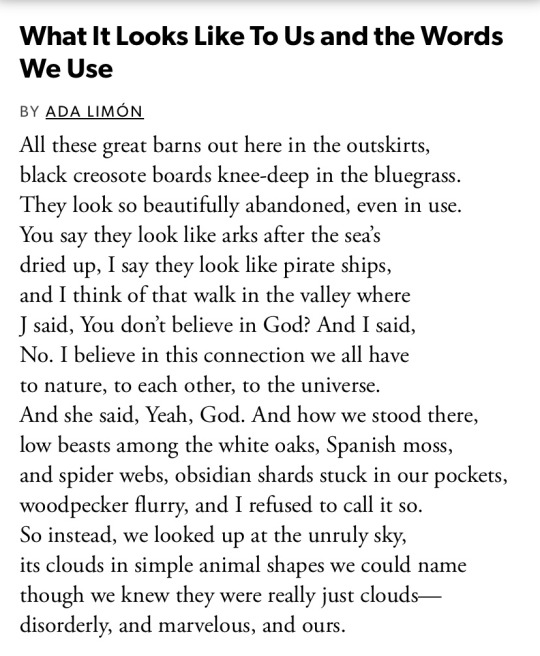
Ada Limon - What it Looks Like to Us and the Words We Use
From: "Bright Dead Things" Sept. 2015
#saresmusings#ada limón#ada limon#for you page#what it looks like to us and the words we use#bright dead things#2015#poetry#poem of the week#poet laureate#poem of the day#literature
5 notes
·
View notes
Text
11.11.2022
feeling shockingly good about the writing for today?????? much more exploratory than previous days (which felt more like i was just writing my way down a list of goals for a scene) … not super sure what to make of it. gently full of doubt of my skills as a direct result but also reminding myself HOW I FEEL ABOUT HOW IT IS GOING HAS LITTLE TO ABSOLUTELY NO RELATION TO HOW IT IS ACTUALLY GOING this is just a RULE THAT IS TRUE ABOUT MY EXPERIENCE WITH WRITING
but also this hmm sandboxed exploratory stuff feels … easier?? but i also worry it’s boring, like i’m just throwing random info in there, what if it’s jarring or irrelevant and i just can’t tell. (THEN ONE OF MY SMART AND BELOVED BETAS WILL CATCH IT OR THERE WILL BE SOME FLAWS IN THIS FAN FICTION THAT I AM WRITING FOR FUN WITH LIMITED PROFESSIONAL WRITING TRAINING THAT I AM PUTTING ONLINE FOR FREE SO WHO CARES what does a perfect fic even look LIKE hidey calm DOWN about this!!) anyway, idk what makes a piece of writing boring vs engaging, i have no idea how to tell if what i’m writing is going to be engaging but i am also reminding myself THAT IS NOT IN SCOPE FOR THE FIRST DRAFT. IT WILL BE HANDLED IN REVISIONS. THAT’S WHY WE HAVE REVISIONS!
in other news today i felt relief of having to write a second draft of this for the first time. not sure what to make of that either. after the first burst of writing, i kinda felt like nothing i wrote connected to anything else i’d written, but then i went back and just idk … like added some sentences to putty over the problems and it seemed to go okay??????? idk i also broke my role of DO NOT FUCKING REREAD ANY PREVIOUS DAY’S WRITING and looked at the most recent day’s writing, and like, it was fine? it wasn’t mindblowing (reminding myself that THAT IS NORMAL AND FINE FOR A FIRST DRAFT OR EVEN A FINAL DRAFT!) but idk it seemed coherent? well. it seemed fine? like it was sentences and nothing was actively wrong with them that i could tell, so yeah maybe it’s fine, who knows, what a fucking hobby what if my characterization is completely off i have no idea what happens in canon anymore—! which is also FINE this is a FAN FICTION i am MERELY MICROWAVING SOME GUY UNTIL HE IS MISERABLE who cares if the narrative is perfectly tightly woven or if everything is relevant and moving!!!! (ME UNFORTUNATELY but NOT IN THIS DRAFT!)
ok goodnight good lord why does this fic is so much cooler in my head and then on the google doc its just some regular sentences??? grrrrr how do i give someone a tummyache from reading ittttttttttttttttttttttttt!!!! but also like god could i finish one fucking draft of it first goodnight i am. incoherent
#hidey does nano 2022#narrative!fic#wow god i am also noticing that there is wayy more brainwrangling in this post than usually#but also like i was really into the west wing in early college (conveniently so was my crush) and like there’s this episode w the us poet#laureate where she (the poet) says something like the point of writing is to get the reader’s attention and then hold it without letting go#until you’re done with the reader. but basically all the way thru the piece of writing. gahhhhhhhhh HOW DO I DO THAT! GRR#oh also lol i mentioned to my therapist today that this fic is like. me processing my childhood and they were like oooh would u wanna talk#ab it in session and i was like hm maybe actually
5 notes
·
View notes
Text
I really should be laying tracks to Balmoral, not trying to simultaneously construct infernal rifle, grind favors for renown society and remove my menaces so I could go diving for peligin-filled box
#i love my laboratory#after rifle i will start cartographer's hoard#for possible use in rats market somewhere in the future#i have so much to do#like collect bones and overcap dangerous and finish poet laureate#fallen london
1 note
·
View note
Text
damn the lyrics really are bad
I didn't want to be a hater but shirley these are some bad lyrics
sounds like something I'd write
1 note
·
View note
Text

The Conditional, by US Poet Laureate Ada Limón
#poetry#poem#floral#solar#solar farm#wildflowers#native wildflowers#solarpunk#defiance#existence#apocalit#inspiriation#favorite#favorite poem#ada limón#ada limon#US Poet laureate#poet laureate#environment#tomorrow#future#hope#possibility#beauty
1 note
·
View note
Link
#late summer after a panic attack#ada limon#ada limón#poet#poetry#poem#poeisis#panic attack#panic attacks#perseverance#keep going#poet laureate#us poet laureate#fave poet#national poetry month#national poetry month day 29#national poetry month 2023#april#april 2023#april 29#catch up
1 note
·
View note
Text
Beauty will come to you, lay down at your feet, put its wild hair in your lap.
“The New World of Beauty” by Ada Limón
#poetry#ada limón#ada limon#us poet laureate#american poetry#sharks in the rivers#quotes#lit scraps#literature#milkweed editions
9 notes
·
View notes
Text
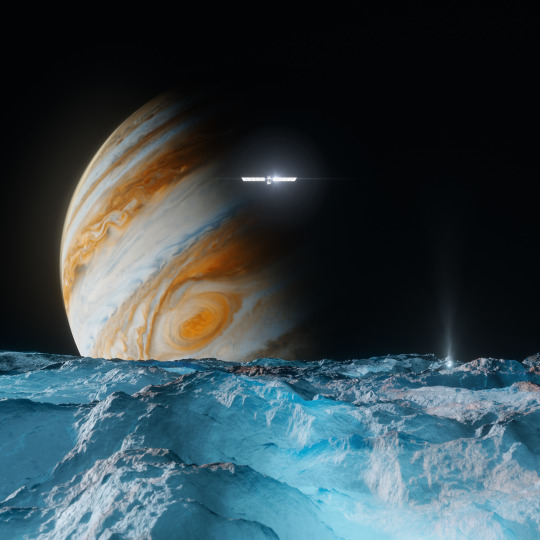
Hurry! You Can Catch a Ride to Jupiter with NASA
Well, at least your name can.
One of the planet Jupiter’s largest and most intriguing moons is called Europa. Evidence hints that beneath its icy shell, Europa hides an ocean of liquid water – more water than all of Earth’s oceans combined. In 2024, our Europa Clipper robotic spacecraft sets sail to take a closer look…and when it launches, your name can physically be aboard! Here’s how:
youtube
NASA’s Message in a Bottle campaign invites people around the world to sign their names to a poem written by the U.S. Poet Laureate, Ada Limón. The poem connects the two water worlds — Earth, yearning to reach out and understand what makes a world habitable, and Europa, waiting with secrets yet to be explored.
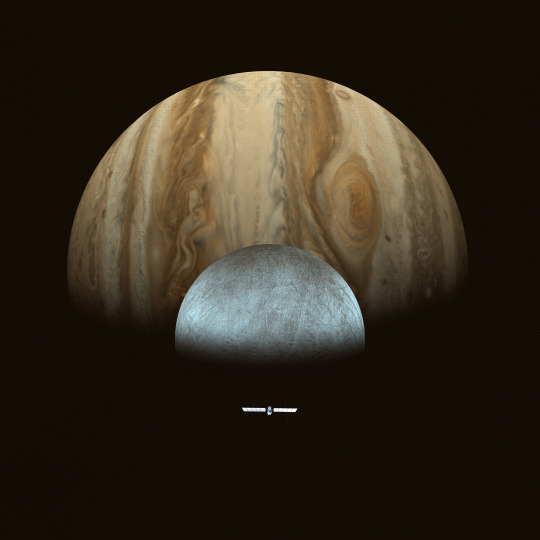
The poem will be engraved on Europa Clipper, along with participants' names that will be physically etched onto microchips mounted on the spacecraft. Together, the poem and names will travel 1.8 billion miles to the Jupiter system.
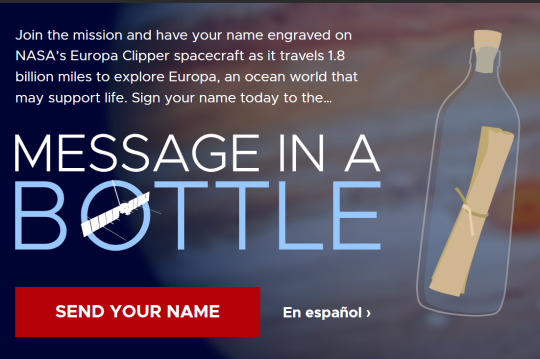
Signing up is easy! Just go to this site to sign your name to the poem and get on board. You can send your name en español, too. Envía tu nombre aquí.
The Europa Clipper launch window opens in October 2024, but don’t wait – everyone’s names need to be received this year so they can be loaded onto the spacecraft in time. Sign up by Dec. 31, 2023.
We hope you’ll be riding along with us! Follow the mission at europa.nasa.gov.
Make sure to follow us on Tumblr for your regular dose of space!
#NASA#Europa#Jupiter#robots#poetry#SendYourName#technology#tech#poet#poem#writers on tumblr#poetic#original poem#Youtube
4K notes
·
View notes
Text
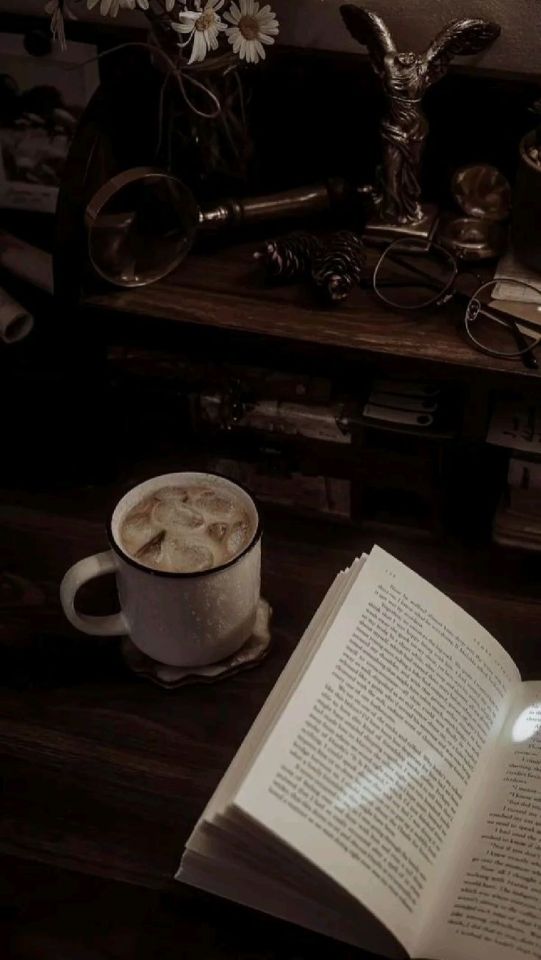
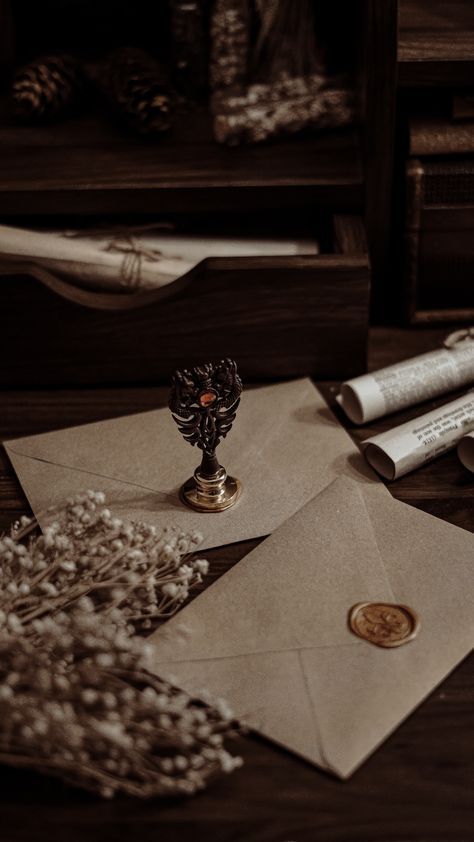
Dark Academia Writing Prompts
A group of students stumble upon a hidden portal to a faerie realm in their college library. They slowly return from the faerie realm, corrupted.
A student uncovers a hidden society within the university's classics department. They are preserving an immortal being who used to be worshiped as a minor deity by the Ancient Greeks.
A secret society of faeries attend an Ivy League university, keeping their identities a secret.
A love letter exchange unfolds between two strangers who communicate solely through notes left in the university library. However, if they ever discovered each other's true identities, the romance would break, and they would be horrified.
A mysterious playwright's lost manuscript is discovered in the dusty archives, revealing a dark and twisted tale that mirrors real-life events on campus.
A cellist sacrifices everything, even their morals, to join an elite orchestra. It's the pinnacle of their career. However, they left one string untied, and it threatens to expose everything they did.
A professor's death sparks an investigation that reveals a web of academic rivalries and betrayal. At the heart of it all is a plagiarism case.
A history major begins to unravel a murder that happened 100 years ago on campus.
A witch disguises herself as a professor in the occult studies department, using her position to recruit students for a secret coven.
A psychology professor uses hypnotic techniques to explore the past lives of students. During the hypnosis sessions, a student reveals something awful that their past life did. Something that's had a profound impact on the professor.
A cursed painting in the university gallery comes to life at night. The characters within it seek the help of a talented art history major to break the spell. They work together to uncover what dark forces made this happen in the first place.
A professor's fascination with ancient folklore prompts a mischievous faerie to seek their help. The faerie asks them to help unlock an ancient riddle. The professor does it, fuelled by academic curiosity, but this turns out to be a huge mistake.
A group of history students uncover evidence of a witch trial that took place on campus centuries ago. One of the victims shown in the painting bears an uncanny resemblance to a current professor. As they investigate, it becomes clear someone’s trying to stop them.
A student journalist investigates a series of mysterious deaths linked to an exclusive literature club. The murders seems to be drawing inspiration from works of literature.
A rivalry emerges between two aspiring poets who will sink to depraved acts for the coveted position of poet laureate. They'll do anything to get that prize, including murder.
By: schoolofplot
My articles on Dark Academia:
Dark Academia aesthetic
The imaginary of Dead Poets Society
The Secret History a key fandom
#aesthetic#moodboard#edit#dark academia#aes#light academia#academia#literature#art#chaotic academia#writing prompt#writing practice#writing#cottagecore#cottage#donna tartt#the secret history#tsh#dead poets society#studyblr#writingblr#writers#writing inspo
284 notes
·
View notes
Text


"I woke up early on my born day; I'm 20, it's a blessin'
The essence of adolescence leaves my body, now I'm fresh and
My physical frame is celebrated 'cause I made it
One quarter through life, some godly-like thing created
Got rhymes 365 days annual, plus some
Load up the mic and bust one, cuss while I pus from
My skull, 'cause it's pain in my brain vein, money maintain
Don't go against the grain, simple and plain
When I was young at this, I used to do my thing hard
Robbin' foreigners, take they wallets, they jewels and rip they green cards
Dipped to the projects, flashin' my quick cash
And got my first piece of ass, smokin' blunts with hash
Now it's all about cash in abundance
Niggas I used to run with is rich or doin' years in the hundreds
I switched my motto; instead of sayin', "Fuck tomorrow!"
That buck that bought a bottle could've struck the lotto
Once I stood on the block, loose cracks produce stacks
I cooked up and cut small pieces to get my loot back
Time is illmatic, keep static like wool fabric
Pack a 4-matic to crack your whole cabbage"....
-Nasir Bin Olu Dara, The Poet Laureate From Queens
Life's A Bitch, Illmatic, 1994
Legendary.
89 notes
·
View notes
Text
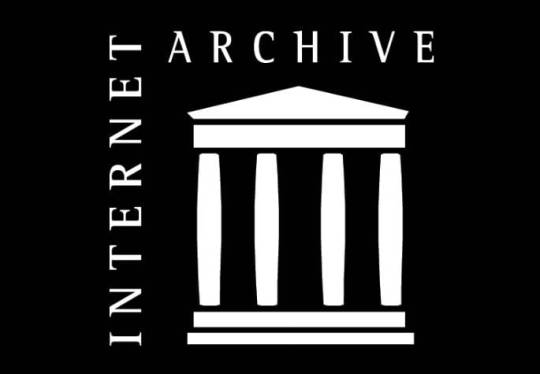
A copyright lawsuit filed by several major publishers puts the future of the Internet Archive's scan-and-lend library at risk. In a recent appeal, the non-profit organization argued that its solution is protected fair use and critical to preserving digital books. This position is shared by copyright scholars, the Authors Alliance, and other supporters now backing IA in court.
The Internet Archive (IA) is a non-profit organization that aims to preserve digital history for generations to come. The digital library is a staunch supporter of a free and open Internet and began meticulously archiving the web over a quarter century ago.
In addition to archiving the web, IA also operates a library that offers a broad collection of digital media, including books. Staying true to the centuries-old library concept, IA patrons can also borrow books that are scanned and digitized in-house.
Publishers vs. Internet Archive
The self-scanning service is different from the licensing deals other libraries enter into. Not all publishers are happy with IA’s approach which triggered a massive legal battle two years ago.
Publishers Hachette, HarperCollins, John Wiley, and Penguin Random House filed a lawsuit, equating IA’s controlled digital lending (CDL) operation to copyright infringement. Earlier this year a New York Federal court concluded that the library is indeed liable for copyright infringement.
The Court’s decision effectively put an end to IA’s self-scanning library, at least for books from the publishers in suit. However, IA is not letting this go without a fight and last week the non-profit filed its opening brief at the Second Circuit Court of Appeals, hoping to reverse the judgment.
Support from Authors Alliance
IA doesn’t stand alone in this legal battle. As the week progressed, several parties submitted amicus curiae briefs to the court supporting IA’s library. This includes the Authors Alliance.
The Authors Alliance represents thousands of members, including two Nobel Laureates, a Poet Laureate of the United States, and three MacArthur Fellows. All benefit from making their work available to a broad public.
If IA’s lending operation is outlawed, the authors fear that their books would become less accessible, allowing the major publishers to increase their power and control. The Alliance argues that the federal court failed to take the position of authors into account, focusing heavily on the publishers instead. However, the interests of these groups are not always aligned.
“Many authors strongly oppose the actions of the publishers in bringing this suit because they support libraries and their ability to innovate. Authors rely on libraries to reach readers and many are proud to have their works preserved and made available through libraries in service of the public.
“Because these publishers have such concentrated market power […], authors that want to reach wide audiences rarely have the negotiating power to retain sufficient control from publishers to independently authorize public access like that at issue here,” the Alliance adds.
This critique from the authors is not new. Hundreds of writers came out in support of IA’s digital book library at an earlier stage of this lawsuit, urging the publishers to drop their case. [...]
Copyright Scholars Back IA
In a separate amicus brief, several prominent legal and copyright scholars, many of whom hold professor titles, raise similar arguments. They believe that IA’s lending system is not that different from the physical libraries that are an integral part of culture.
“Libraries have always been free under copyright law to lend materials they own as they see fit. This is a feature of copyright law, not a bug,” the brief reads.
What is new here, is that publishers now assert full control over how their digital books are treated. Instead of allowing libraries to own copies, they have to license them, which makes it impossible to add them to the permanent archive.
“The major publishers refuse to sell digital books to libraries, forcing them to settle for restrictive licenses of digital content rather than genuine ownership. Moreover, publishers insist they can prevent libraries from scanning their lawfully purchased physical books and lending the resulting digital copies.” [...]
149 notes
·
View notes
Text
But everybody I spoke to in Vienna showed an honest unconcern. They invited each other to full-dress parties (little thinking that they would soon be wearing prisoner's clothes in a concentration camp), they were lavish customers at Christmas for their beautiful homes (little thinking that in a few months they would be confiscated and plundered). And this eternal gay unconcern of old Vienna which I had formerly so much loved and which, as a matter of fact, I am always redreaming, this gay unconcern which Vienna's poet laureate Anzengruber once caught concisely in Es kann Dir nix g'schehn- for the first time it gave me pain. In the last analysis it seems likely that they were wiser than I, all those friends in Vienna, because they suffered everything only when it really happened, whereas I had already suffered the disaster in advance in my fantasy, and then again when it became reality. In any event, I no longer understood them and could not make myself understood by them. I stopped warning people after the second day. Why disturb people who do not wish to be disturbed?
It is not a decorative afterthought but the sober truth when I say that in those last two days in Vienna I looked at all the familiar streets, every church, every park, every hidden corner of my native city, with a despairing, silent "nevermore." I embraced my mother with the secret thought, "It is the last time." I reached to everything in the city, in the land, with this "never again," knowing that it was a farewell, a farewell for ever. I passed through Salzburg where stood the house in which I had worked for twenty years without even getting off at the station. I could have seen my house on the hill from the train window, with all its memories of faded years. But I did not look. What was the use? I would never again occupy it. And the moment when the train rolled across the Austrian border I knew, as did Lot in the Bible, that all that I had left behind was dust and ashes, a past frozen to a pillar of salt.
Stefan Zweig, The World of Yesterday
123 notes
·
View notes